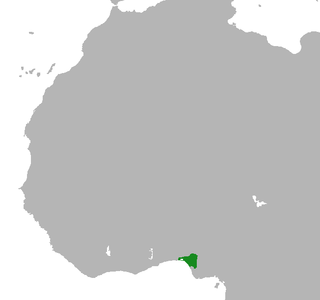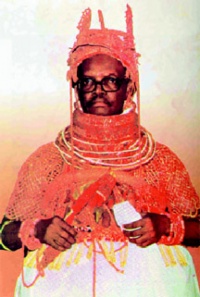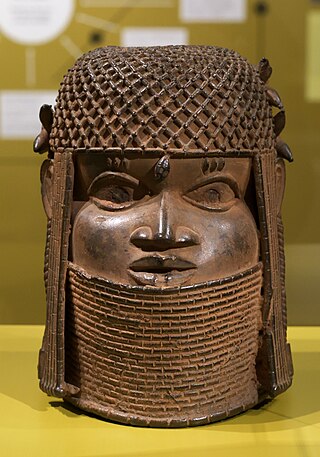Related Research Articles

The Oba of Benin is the traditional ruler and the custodian of the culture of the Edo people and all Edoid people. The then Kingdom of Benin has continued to be mostly populated by the Edo.

Agnatic seniority is a patrilineal principle of inheritance where the order of succession to the throne prefers the monarch's younger brother over the monarch's own sons. A monarch's children succeed only after the males of the elder generation have all been exhausted. Agnatic seniority excludes females of the dynasty and their descendants from the succession. Contrast agnatic primogeniture, where the king's sons stand higher in succession than his brothers.

Ewuare, originally known as Prince Ogun, was the twelfth Oba of the Benin Empire from 1440 until 1473. Ewuare became king in a violent coup against his brother Uwaifiokun which destroyed much of Benin City. After the war, Ewuare rebuilt much of the city of Benin, reformed political structures in the kingdom, greatly expanded the territory of the kingdom, and fostered the arts and festivals. He left a significant legacy in the Kingdom of Benin

The Kingdom of Benin, also known as the Edo Kingdom or Benin Kingdom, was a kingdom within what is now southern Nigeria. It has no historical relation to the modern republic of Benin, which was known as Dahomey from the 17th century until 1975. The Kingdom of Benin's capital was Edo, now known as Benin City in Edo State, Nigeria. The Benin Kingdom was "one of the oldest and most developed states in the coastal hinterland of West Africa". It grew out of the previous Edo Kingdom of Igodomigodo around the 11th century AD, and lasted until it was annexed by the British Empire in 1897.

Erediauwa was the 39th Oba of Benin, traditional ruler of the Edo people in Benin City, Edo State, Nigeria. Formerly known as Prince Solomon Akenzua, Oba Erediauwa's full title was His Royal Majesty Omo n'Oba n'Edo Uku Akpolokpolo Erediauwa I. He was succeeded by Ewuare II.

Ọmọ n'Ọba n'Ẹdo Uku Akpọlọkpọlọ, Akenzua II was the thirty-seventh Oba of Benin reigning from 1933 until his death in 1978.
The Kingdom of Ugu is a kingdom that exists in Nigeria, in what is now Edo State. The Edo State is also called Benin, though it is not to be confused with the country. The Kingdom of Ugu originated out of Igodomigodo in Nigeria.
Oba Feyisara John Odimayo was the reigning king of Ode-Irele in Ondo State, Nigeria from 1976 to 1993. He was from a group of people called 'Ikale' a sub tribe of the Yoruba tribe in Nigeria.
Agba N'Ojieof Uromi, originally called Agba, was the ruler of the Esan people from 1483 AD until 1507 AD. He is an important Onojie in the history of the Esan people. He was instrumental in the independence of Esanland from the old Benin Empire. He stopped tributes from Enijies in Esanland from being paid to the Oba of Benin and stopped any appeal cases being taken from Esanland to the Oba's Palace for retrial during the time of Ozolua n'Ibarmoi.

The Iyoba of Benin is an important female titleholder in the chieftaincy system of the Kingdom of Benin, a Nigerian traditional state. She is otherwise known in English as the Queen Mother.
Ezomo of Benin is a title held by the supreme war chief in the ancient Benin Kingdom. The chief with the Ezomo title is the 3rd highest ranking chief in the Benin Kingdom. The title was initially awarded to any notable warrior in the Kingdom by the Oba of Benin. However, during the reign of Ezomo Ehenua, the Oba of Benin Kingdom, Oba Akenzua I, made the title hereditary to the Ehenua family. The Ezomo is known to live in Uzebu in a semi-independent state.
Ovia is a deity in the traditional religious beliefs of Nigeria, particularly among the Edo people of Benin City. This deity is associated with concepts of peace and providence. Ovia's historical origins can be traced back to the ancient Kingdom of Benin, known for its cultural traditions and governance structure. Emerging during a period of relative stability, Ovia was regarded as a symbol of peace and prosperity within the kingdom. Oral traditions and cultural practices have preserved the significance of Ovia across generations. Ovia was believed to bestow blessings that contributed to the well-being of the kingdom, fostering an environment of harmony and abundance. The deity was invoked during ceremonies, including royal coronations and harvest festivals.

Oguola was the fifth Oba of the Benin Kingdom, reigning from 1280 AD to 1295 AD. His reign was marked by achievements in fortifying the city of Benin, enhancing its defences, and contributing to the cultural and economic development of the kingdom. Born into the royal family, Oguola's ascent to the throne was prompted by the extended absence of his elder brother, Prince Obuobu, who was engaged in military campaigns. This unorthodox succession was a pragmatic decision by the kingdom's elders and advisors to ensure stability and effective leadership during a critical period.
Obanosa, originally known as Prince Osifo, was the thirty-first Oba of the Benin Kingdom, reigning from c. 1804 AD – c. 1816 AD. His reign was marked by a notable conflict known as the Okpughe. Little is known about Obanosa's early life, including specific details about his birth date and place of birth. However, historical records indicate his royal lineage within the Benin Kingdom, and he ascended to the throne following the passing of his predecessor, Oba Akengbuda.

Osemwende, originally known as Prince Eredia-uwa, was the thirty-third Oba of Benin who reigned from c. 1816 AD – c. 1848 AD. He was the son of Oba Obanosa and the brother of Ogbebo, whom he defeated in a civil war to claim the throne. He restored peace and stability to the kingdom after a turbulent period of succession crisis and expanded and consolidated his empire through military conquests and diplomatic alliances. He also promoted trade and commerce with foreign nations, especially the Portuguese, and fostered art and learning among his people. He was revered as a wise and benevolent ruler who brought good tidings to his kingdom.
Akengbuda was the thirtieth Oba of Benin who reigned from c. 1750 AD – c. 1804 AD. He was the son and successor of Eresoyen, and the father of Obanosa. He is regarded as one of the most powerful and influential obas in the history of the Kingdom of Benin, as he expanded the kingdom's territory, improved its administration, and promoted its arts and culture. He also maintained a strong trade relationship with the Europeans, especially the Portuguese and the British, and acquired firearms and other goods from them. He was known for his military prowess, his diplomatic skills, and his patronage of arts and learning.
The Battle of Ekiokpagha was a military conflict that took place in 1255 AD on the Plains of Ogboka, near Benin City, between Ewedo and Ogiamien III, the head of a royal family in the Benin Empire. The battle was a result of a power struggle between the two parties, who had different claims to the throne and territory of Benin. Oba Ewedo was victorious and established his palace at the site of the battle. Ewedo recognized Ogiamien III as a chief under Ewedo's kingship. The battle and its aftermath have been reenacted in the coronation rituals of the subsequent Obas of Benin, as a symbol of the historical and traditional enmity between the Oba and the Ogiamien family.
Uwakhuahen was the second Oba of the Kingdom of Benin, reigning from 1235 AD to 1243 AD. He was the son of Eweka I, the initiator of the Oba dynasty and the inaugural ruler to bear the title Oba. Upon the demise of his father, he ascended to the throne, although he did not designate an heir apparent.

Ehengbuda served as the eighteenth Oba (monarch) of the Benin Empire, with a reign from c. 1578 AD – c. 1606 AD. He was the son and successor of Orhogbua, the first Oba to establish contact with the Europeans. Ehengbuda expanded the Benin Empire to the west and east, and strengthened its control over several tributary states. He also interacted with the Portuguese and the English, and received gifts such as a telescope from them. His death in a maritime storm while returning from a visit to his colony in Lagos marked the end of the era of warrior kings in Benin history, as the subsequent Obas delegated the command of the military to their chiefs.
Ohuan, originally known as Prince Odogbo, was the nineteenth Oba of Benin who ruled from circa 1606 AD to 1641 AD. He was the only son of Ehengbuda, and he succeeded his father after his death. He is known for his unusual birth story, his rebellion against his Iyase Ogina, and his expansion of the Benin Kingdom through warfare. He died without an heir, leading to a succession crisis and a decline of the kingdom.
References
Notes
- 1 2 3 "Oba of Benin Dynasty". 2023 Shop. Retrieved 5 October 2023.
- 1 2 3 4 Omozusi 1997, p. 34.
- 1 2 3 4 5 "Benin Obas {1200AD -Present}". edoworld.net your Guide To The Benin Kingdom & Edo State, Nigeria. Retrieved 5 October 2023.
- 1 2 n'Edo & Akpolokpolo 1997, pp. 30–33.
- 1 2 3 4 Ẹbọhọn, Ọ. (1979). Eguae Oba N'Edo. Eribo Printers. Retrieved 5 October 2023.
- 1 2 P 1995, p. 54.
- 1 2 3 Bradbury 1959, pp. 263–287.
- 1 2 3 Usuanlele & Falola 1994, pp. 303–318.
- 1 2 Ryder, A.F.C. (1969). Benin and the Europeans, 1485–1897. Ibadan history series. Humanities Press. Retrieved 5 October 2023.
- 1 2 3 4 Bendel Arts Council 1979, p. 28.
- ↑ Blackmun 1991, pp. 63.
Bibliography
- n'Edo, Omo n'Oba; Akpolokpolo, Uku (1997). "Opening Ceremony Address". African Arts. 30 (3). UCLA James S. Coleman African Studies Center: 30–33. doi:10.2307/3337495. ISSN 0001-9933. JSTOR 3337495 . Retrieved 5 October 2023.
- Usuanlele, Uyilawa; Falola, Toyin (1994). "The Scholarship of Jacob Egharevba of Benin". History in Africa. 21. Cambridge University Press (CUP): 303–318. doi:10.2307/3171890. ISSN 0361-5413. JSTOR 3171890. S2CID 161203337.
- Bradbury, R. E. (1959). "Chronological Problems in the Study of Benin History". Journal of the Historical Society of Nigeria. 1 (4). Historical Society of Nigeria: 263–287. ISSN 0018-2540. JSTOR 41970638 . Retrieved 5 October 2023.
- Omozusi, N.O. (1997). The Benin Kingdom a Century After British Invasion. Mufti International Services. ISBN 978-978-2692-14-6 . Retrieved 5 October 2023.
- P, B.E.N.A. (1995). ART OF BENIN 2E PB (in Dutch). Smithsonian. ISBN 978-1-56098-610-2 . Retrieved 5 October 2023.
- Bendel Arts Council (1979). Ivie. Bendel Arts Council. Retrieved 5 October 2023.
- Blackmun, Barbara Winston (1991). "Who Commissioned the Queen Mother Tusks? A Problem in the Chronology of Benin Ivories". African Arts. 24 (2). UCLA James S. Coleman African Studies Center: 55–91. ISSN 0001-9933. JSTOR 3336853 . Retrieved 12 October 2023.